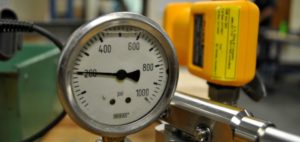Metrology Glossary: Gauge Pressure
What Is Gauge Pressure?
Gauge pressure refers to the pressure of a fluid in relation to the surrounding atmospheric pressure. It is quantified using a gauge, an instrument designed to measure the variance in pressure between the fluid and the atmosphere. Gauge pressure is considered positive when the measured pressure exceeds atmospheric pressure, and negative when it falls below atmospheric pressure. The standard unit for gauge pressure is pounds per square inch gauge (PSIG). 100 PSIG is equivalent to 114.7 pounds per square inch absolute (PSIA), which represents the combined value of gauge pressure and atmospheric pressure.
Why Is Gauge Pressure Important?
- Monitoring Pressure in Enclosed Systems: Gauge pressure serves as a critical parameter for overseeing the pressure of liquids and gases within closed systems such as pipelines, storage tanks, boilers, and compressed air lines. This is instrumental in ensuring safe operations, averting potential leaks or explosions, and optimizing overall system performance.
- Utilization in Pneumatic and Hydraulic Systems: Gauge pressure plays a pivotal role in governing the functions of pneumatic and hydraulic systems employed in diverse sectors such as manufacturing, construction, and transportation. It facilitates the precise regulation of force, speed, and the directional movement of actuators and machinery, contributing to enhanced operational control.
- Application in Vacuum Technology: Negative gauge pressure, indicative of pressures below atmospheric levels, proves indispensable in various vacuum-related applications, including vacuum pumps, chambers, and industrial processes. The monitoring and maintenance of specific vacuum levels are crucial in scientific research, semiconductor manufacturing, and other specialized fields where precise pressure control is imperative.

Related Terms
A compound pressure gauge is a tool for measuring pressure that uses a dial to exhibit both positive and negative (vacuum) pressures....
A vacuum gauge is a specialized tool used to measure the pressure within a vacuum, characterized by a pressure level lower than that of the Earth's atmospheric conditions....
A pressure gauge is an instrument designed to quantify the force exerted on a surface in relation to the surface’s area by a fluid. There are two primary types of...








